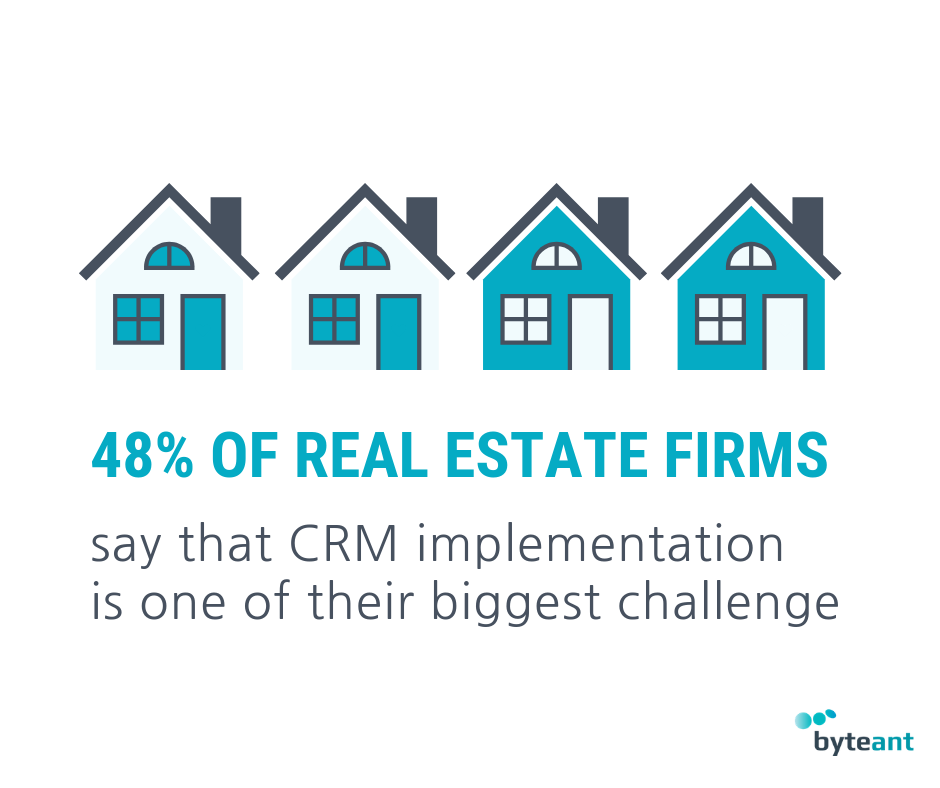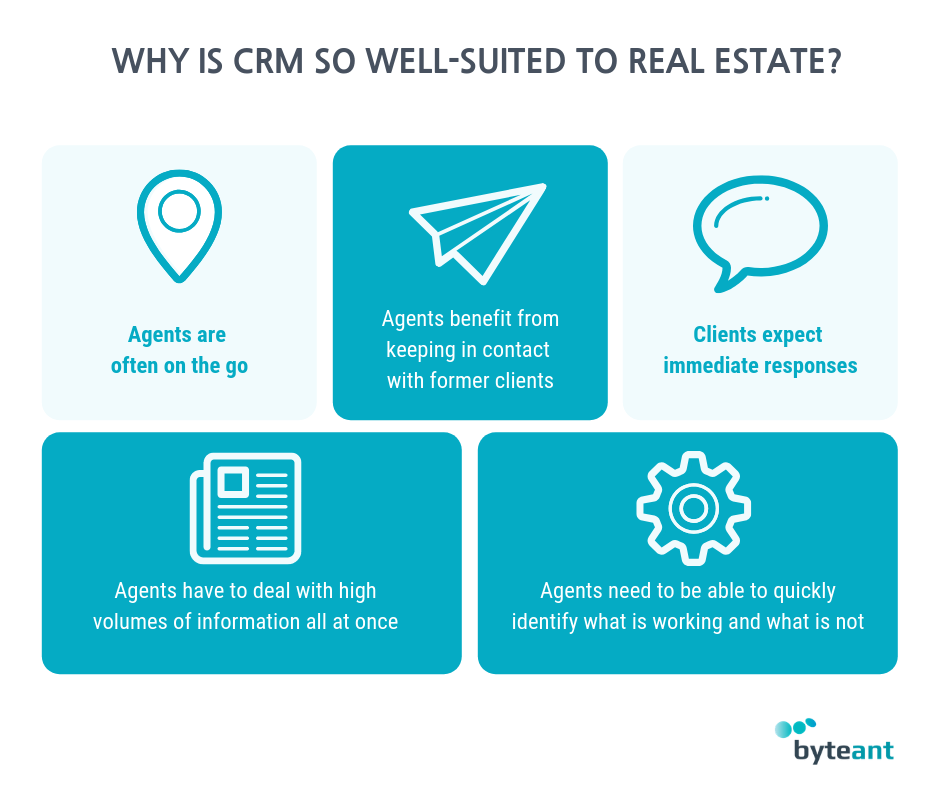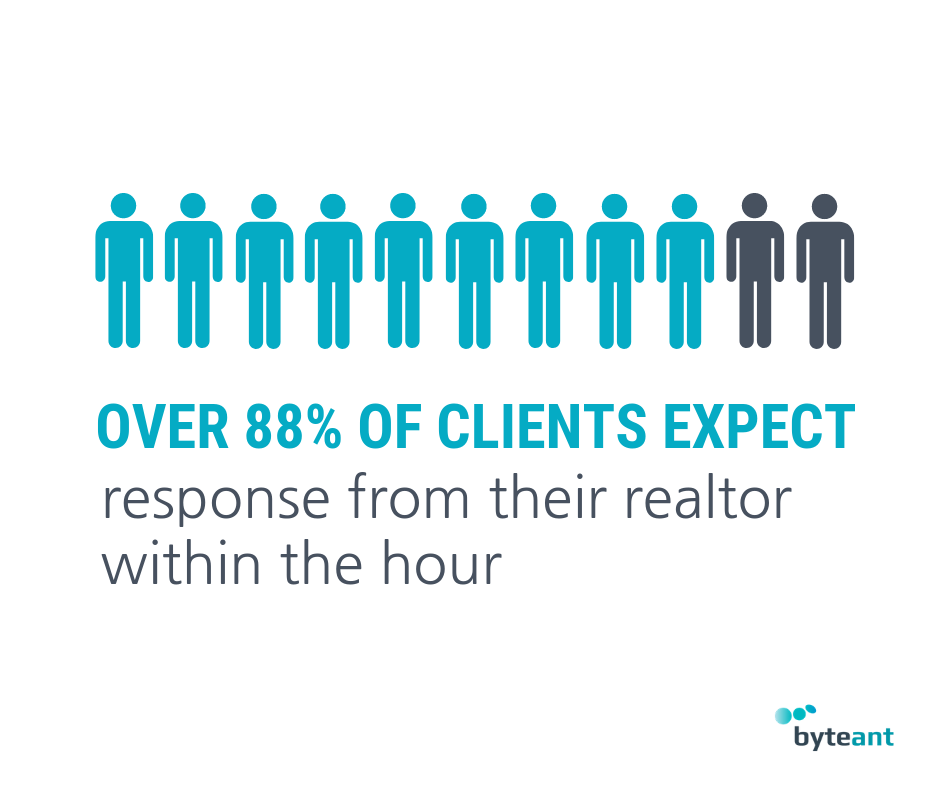View our Guide How to Build a Marketplace in 10 weeks x


Today, Customer Relationship Management (CRM) systems are fairly appreciated and widely implemented among numerous successful and beneficial enterprises across various industries. Contemporary CRM solutions provide companies with the best business opportunities they can, while leveraging innovative tech-enabled software development practices. The recent stats on CRM efficiency provided by Thomson Data make it obvious that CRMs keep gaining more and more traction these days, especially when it comes to improving customer experience. Here’s a list of high spots on the matter:
More than any other industry, Real Estate has the necessity to tackle a great number of today’s market challenges. What does a prosperous real estate agency usually do? Nowadays, it goes much further than just buying and selling houses. The key aspect remains, of course, acquiring a client and closing a lead, but a good realtor should perform in a more effective, quick and competitive way. The expected multitasking functions get difficult to conduct simultaneously: browsing real estate web sites, managing the clients’ database, advertising, sending emails, posting videos, using blogging platforms and social networks, meeting with people, etc. Time is money, so CRM solutions for real estate come in handy.

Basically, CRM provides you with a rich set of options necessary for time- and cost-efficient customer data management. Also, the system adds much to the overall workflow optimization and productivity. Here’s a generalized list of key features of real estate CRM software:

CRM software allows saving a considerable amount of time, effort and resources by automating contacts, sales, customer interaction and other data workflows. Let’s have a closer look at the benefits of the Real Estate CRM business solution.
A good real estate CRM is designed to organize data that comes from different sources. Real estate buyers use numberless sites and applications, sign up for a slew of email newsletters, social media groups, and suchlike. That is why CRM software is an important tool for seamless client data orchestration in bringing in new leads. It helps categorize loads of unstructured customer data, prevents it from doubling and consolidates it into a holistic database, therefore providing invaluable insights, on the basis of which companies can fine-tune their strategies for product development and customer retention.
The era of office brokers has been substituted by on-the-go agents who need to be everywhere at the same time negotiating with new leads, visiting properties, socializing with clients 24/7, advertising, etc. Desktop and mobile CRM solutions enable real estate agents to productively fulfill a diverse range of duties providing access to the stored in the cloud database with an understandable user interface on synced portable devices. Being initially flexible and scalable, CRM is easily customized to the individual business needs and volume. Location-oriented marketing as one of the most prominent real estate CRM features becomes efficient due to advanced geolocation technologies although the broker’s location may gain zero limitations.
Immediate responses are essential for property realtors more than in any other industry. Potential clients want to feel valued and appreciated when it comes to choosing between relatively equal business proposals and deciding, which is the best match to spend a considerable amount of money on. Quite competitive and expensive sphere of the market as it is, real estate can sufficiently leverage from CRM-based decisions. Once a client interacts with an agent, the system triggers real-time push notifications, may automatically enable smart chatbots, send follow-up emails or messages, manage calendars and choose other preferable ways of communication.

Real estate software tools provide access to previous customer experience and can forecast future sales based on historical data. The complex analysis of customer trading habits backed by CRM efficiencies results in maximizing revenues within the sales targets. Real estate CRM systems give the profound possibility to track customers’ behavior and predict requirements and queries by keeping in touch with clients via mobile apps, email campaigns, social media or call centers. More to say, once a client - always a client. Although former real estate buyers are unlikely to purchase property again, they may act as referrals or brand advocates and provide positive recommendations, so it is crucial to maintain consistent relations with past clients. Scheduled newsletters, discount offers, invitations and even postcards are good – so let your CRM system get things done for you.
To stay compatible real estate agents truly need actionable customer data analytics work for them. Implementing CRM software in the real estate sector enables companies to acquire valuable insight on possible customer interaction breaches and inconsistencies, which also contributes to better business decision-making. Based on ML and AI solutions the system seamlessly provides tracking sales and leads, optimize the overall performance, evaluates weak points, reacts to bugs and other vulnerabilities. Agents get scalable deal rates, realize potential problems, study analytical reports about profitable interactions and successful campaigns. Real-time feedback from clients are perfect for making quick decisions: they usually show buyers’ preferences and intentions. Social media networks, as one of the meaningful channels for customer interaction, play an important role in customer engagement and retention.
It goes without saying that most of the popular CRM systems on the market are not at all limited to the features above. However, there is a flip side of out-of-the-box CRM solutions, namely a lack of personal touch when it comes to integrating a ready-made platform with your business software. And this is the case when a weather-beaten cliché comes to mind, saying there is no one-size-fits-all solutions.
The fact is, that universal CRM systems are unlikely to fully satisfy your ever-changing business requirements being unable to address the individual needs of your customers.
In view of this, here’s a checklist of key takeaways for you to remember, when you are about to choose a robust CRM solution for your real estate business.
Make a list of all the necessary requisites, features and tools, which you need for your business. It will help you narrow down the list of prospective CRM vendors.
There are plenty of popular CRM solutions from the large-scale software vendors. However, it is more advisable to consider small budding companies that provide unique user experiences with tech-enabled solutions. They may turn out to be more suitable for your individual business needs.
What you definitely need is a flexible and reliable CRM platform, able to handle ever-growing business operational efficiencies and not to suffer from regular system downtimes, lagging issues and data losses.
Choose a company with a good reputation. Find out if it is recommended among your colleagues or friends. Surf the net for more reviews and comments.
Don’t forget to estimate the overall cost of hardware, maintenance, storage, services, staff training and other expenses. It may cost you a fortune, be money-intelligent.
Remember that cloud computing is shooting the stars. So, choose cloud-based CRM solutions for your real estate business to pave the path to surefire success.
Don’t be afraid to ask a free-of-charge monthly trial. Study all pros and cons practically. Finding some special discount offers will also be a great idea.
Although CRM is aimed at automating your business processes, don’t forget that customers feel more appreciated when addressed personally in a live interaction.
Collect responses across the channels, identify drawbacks, find the reasons, make new decisions through A/B testing. Correcting mistakes on time leads to a win-win situation with your customers.
Always stay open for new software opportunities. Although CRMs usually do most of the work for you, never stop keeping tabs on new features that can give you a competitive edge in business and significantly improve customer experience.
You can also check an interesting customer engagement software on Dixa.com.
If you are still on the fence about choosing a robust Real Estate CRM platform that can truly streamline your business efficiency, do not hesitate to contact us right away and see how our actionable CRM solutions help get you covered on that.